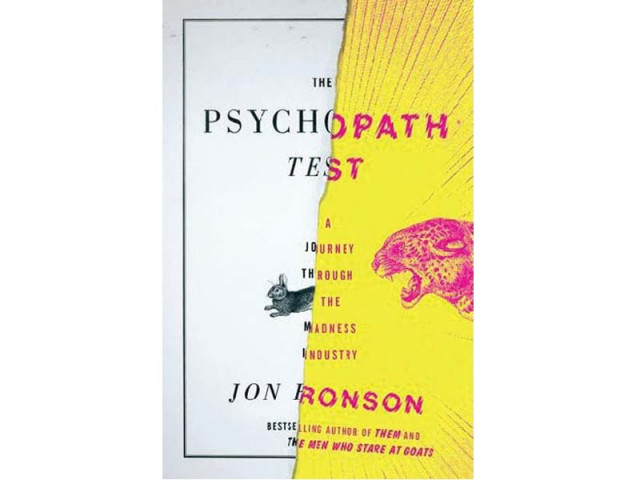It’s a mad, mad world
A journey into the minds of the mad, from death squad leaders to battling CEOs.

It’s a mad, mad world
Book: The Psychopath Test: A Journey Through the Madness Industry
Author: Jon Ronson
Genre: Non-fiction
Publisher: Picador (2011)
Excerpt:
“Tony said faking madness was the easy part, especially when you’re seventeen and you take drugs and watch a lot of scary movies. You don’t need to know how authentically crazy people behave. You just plagiarise the character Dennis Hopper played in the movie Blue Velvet. That’s what Tony did. He told a visiting psychiatrist he liked sending people love letters straight from his heart, and a love letter was a bullet from a gun, and if you received a love letter from him, you’d go straight to hell.
Plagiarising a well-known movie was a gamble, he said, but it paid off. Lots more psychiatrists began visiting his cell. He broadened his repertoire to include bits from Hellraiser, A Clockwork Orange, and the David Cronenberg movie Crash ...
Tony said the day he arrived at Broadmoor, he took one look at the place and realised he’d made a spectacularly bad decision. He urgently asked to speak to psychiatrists. “I’m not mentally ill,” he told them. It is an awful lot harder, Tony told me, to convince people you’re sane than it is to convince them you’re crazy.”
Writer Jon Ronson delves into the world of psychopathy in The Psychopath Test, his latest book in which he explores the arena of mental illnesses and their detection. The author of bestsellers including Them: Adventures with Extremists (2001) and The Men Who Stare at Goats (2004) takes a look at the madness industry and then relates his observations via a self-reflective analysis that touches on many interesting and provocative ideas.
The Psychopath Test begins with the writer trying to solve the mystery of a cryptic book that had been mailed to a few select academics and scholars by an unknown sender, and eventually realising how one person’s “craziness had had a huge influence on the world”.
As he ventures into the psychological sphere, he comes across the Diagnostic and Statistical Manual of Mental Disorders, the repository of all known mental disorders, and the Hare Psychopathy Checklist, a 20-point checklist devised by Robert D. Hare to identify psychopaths, which Ronson learns to apply after taking a three-day residential course taught by the list’s creator.
Armed with his newfound skills as a psychopath spotter, the author sets out to apply the checklist on potential suspects, along the way coming across people including a patient confined to a psychiatric hospital after faking psychopathy to get out of a prison sentence, and then being unable to prove his sanity; a former CEO with a reputation for ruthlessly firing people; and a former Haitian death-squad leader, now incarcerated for mortgage fraud. The writer also meets various people who touch upon topics like the exploitation of those who inhabit the fringes of normalcy, the vested interest of pharmaceutical companies, and the works of psychiatry naysayers.
Presented as investigative pieces built around a loosely-tied narrative reflecting the author’s journey and discoveries, the book highlights the dubious nature of the psychiatry manuals and checklists, their overuse and the dangers and repercussions of misdiagnosis, and our proclivity to define people based on their craziest attributes. But perhaps the most interesting insinuation in the book is that there might be a “preponderance of psychopaths at the top — in the corporate and political worlds — a clinical absence of empathy being a benefit in those environments”, and the idea that it might actually be madness that makes the world go round.
Each person and each story presented in the book is fascinating in its own way, and The Psychopath Test makes a complicated topic easier to understand and more accessible to the general audience. However, at times there seems to be room for a more detailed look into the dark nooks and corners that the author mentions, along with more firmer exploration of some of the topics (like the issues affecting the corporate and political world). Still, The Psychopath Test makes for a fascinating read, and it presents a well-researched content in an interesting, albeit slightly meandering, way.
Published in The Express Tribune, June 25th, 2011.



















COMMENTS
Comments are moderated and generally will be posted if they are on-topic and not abusive.
For more information, please see our Comments FAQ